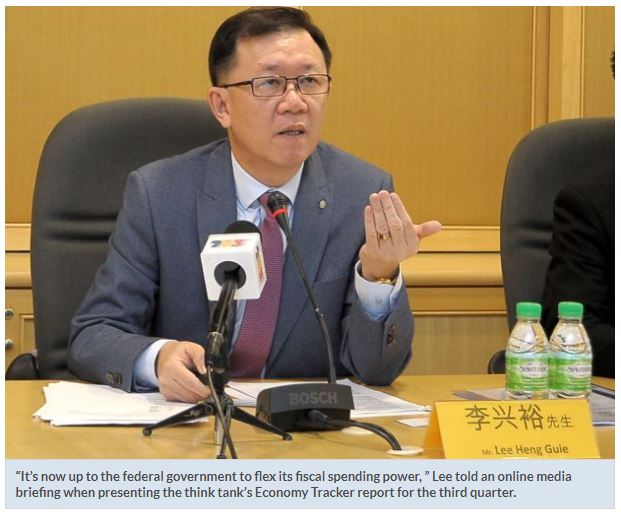Malaysia: More government spending needed for recovery
KUALA LUMPUR: Budget 2021 is expected to have a targeted fiscal expansionary stance to sustain a stronger economic revival, according to Socio-Economic Research Centre (SERC) executive director Lee Heng Guie. (pic)
“It’s now up to the federal government to flex its fiscal spending power, ” Lee told an online media briefing when presenting the think tank’s Economy Tracker report for the third quarter.
He expected the government to budget a deficit of between 5.5% and 6% of gross domestic product (GDP) for next year.
Lee said that as the government’s debt ceiling had been raised from 55% of GDP to 60%, it can borrow an additional RM70bil to RM75bil, assuming a GDP value of between RM1.4 trillion and RM1.5 trillion.
According to him, the Malaysian economy was at a early stage of recovery after government stimulus packages helped to stabilise the economy and limited an economic contraction.
“We still need a very strong and targeted, impactful business support, ” said Lee.
He warned that a pullback or reduction in public spending would trigger a renewed economic contraction if the private sector has not recovered to take up the slack.
The think tank’s report concurred with the central bank’s assessment that the Malaysian economy’s stabilisation has started to trickle in since June, raising cautious optimism that real GDP would show a much more moderate pace of decline and positive growth in the third and fourth quarters.
SERC expected the economy to decline by 4%, a revision from a 3% decline previously (versus Bank Negara’s revised estimates of a contraction of between 3.5% and 5.5%) this year.For 2021, SERC saw a rebound in economic growth to 5% on the assumption of a stronger growth upturn in the second half (versus the central bank’s projections between 5.5% and 8%).The think tank said its tracking of selected private consumption indicators showed a mixed performance.
“There are positive signs of recovery in household spending since May as reflected in passenger car sales, sales of food and beverages and consumption credit. However, the end of automatic loan moratorium in September and transition towards a targeted loan repayment flexibility may temper household loan demand.”
It noted that the banking system’s outstanding loans growth increased by 4.4% year-on-year in August 2020 (4.5% in July versus 4.1% in June), mainly supported by households’ loan demand, particularly for the purchase of passenger cars and residential property.
Outstanding business loan growth moderated to 3.3% in August from 3.9% in July on lower disbursement for working capital.
Among SERC’s proposed initiatives for Budget 2021 are an extension of a voluntary reduction in the EPF’s employees’ contribution rate for 2021; EPF’s i-Lestari withdrawal of RM500 per month from April 2021 to December 2021; reduction in personal income tax rate for middle-income earners; extension of RM30 public transport subsidy for another year to December 2021; extending the wage subsidy programme to end-June 2021; a suspension of foreign workers levy in 2021 or a 50% reduction in foreign levy; extending the electricity tariffs discount; extending the special tax deduction on reduction of rental for another six months from October 2020 to end-March 2021; and a review of the company income tax rate.
Source: https://www.thestar.com.my/business/business-news/2020/10/07/more-government-spending-needed-for-recovery


 Thailand
Thailand




